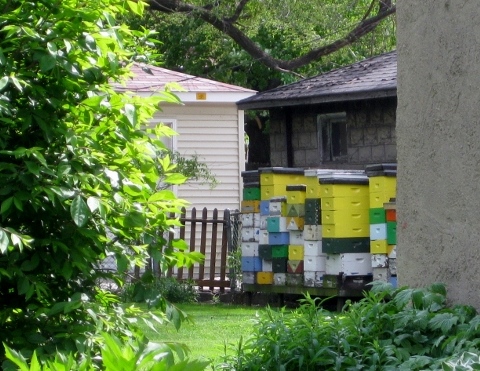Its summer, here. Flowers and gardens are blooming. Bees are buzzing in the neighbourhood, and more, if you have backyard beehives.
A Yes! magazine article this week, Four Ways to Build a Bee-Friendly Neighborhood, gave some great tips for alleviating neighbour concerns, associated with urban beekeeping. I also thought the tips offer a larger model for conflict management, especially of the other, the fear of change, and something different.
Four ways to address neighbourhood concerns around urban beekeeping
I summarize the four suggestions (from the article), along with my mediator lens on why its’ a good strategy:
1. Set your hives up early; before you bring in the bees, show your intention, provide opportunity for any neighbour concerns to come forward.
Rationale: be unconditionally constructive in your communications, don’t blindside
2. Educate your neighbours about bees if they ask; are the neighbours afraid or just curious about bees, explain in a meaningful what the hives/bees are all about…
Rationale: the power of story
3. Ask for their cooperation; bees don’t respond well to harmful chemicals, ask your neighbours to give advance warning when they are spraying lawn pesticides (and you’ll keep you bees indoor that day)…
Rationale: conversations change us
4. Give them honey; a free jar of honey to your neighbour can go a long way, “catch more flies with honey, than vinegar”…
Rationale: appreciation is our greatest psychological need
Extending the urban beekeeper strategy
Whether they recognize it or not, the urban beekeeper who employs the above approach is serving up an innovative and valuable model for change and conflict management, and dare I say, collaborative behaviour, writ large.
It models:
-
Living with uncertainty. Though they (bees) don’t speak our language, we are still communicating with them, making common, peacefully co-existing. That’s the spirit of diversity and inclusion, and the paradox of “control”.
-
Finding common ground through connection to a higher purpose. Bees don’t recognize property lines. Finding common ground and shared interests requires us to move beyond our (neighbour) boundaries, and to gaze towards something bigger, as per Lorne Daniel’s fine piece this week on Terrain.org, BEYOND THE BORDER: CULTIVATING LOYALTY TO PLACE. Seeing beyond our border is an act of busting silos.
-
Nature as a 3rd party neutral. The presence of a 3rd party neutral can help mediate inter-personal change and conflict. Nature (e.g., bees) is a neutral 3rd party, in its purest form. Nature can shift us, without doing anything, other than just being. We can trust nature. As food is a vehicle for bridging differences, so is nature. Maybe tense negotiations between disputing parties can be reduced, through excursions into nature, onto land, places of beauty…
Ever used nature to mediate a conflict?


[…] gardening projects that benefit both properties. Asking neighbors to provide notice about lawn pesticide applications helps beekeepers protect their hives from harmful chemicals. If you're concerned about water […]